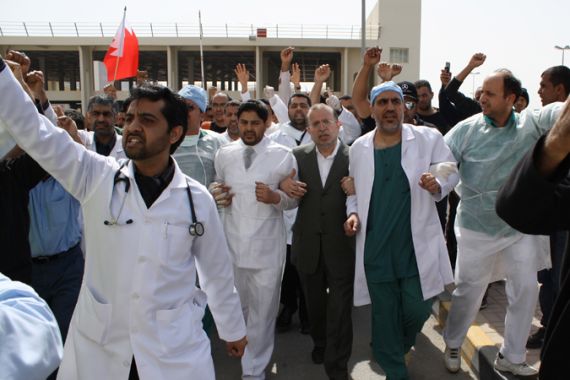
Is Bahrain truly on the path of reform?
The king has agreed to implement reforms after a commission said excessive force had been used against protesters.
A group of Bahraini doctors, who had been sentenced to long jail terms for their role in anti-government protests by a special military court in September, have been back in a civilian court for a re-trial.
|
“This reform is a process. The two pillars that [are] at least agreed upon at this stage, is the BICI report and the national dialogue. We need positive input … from the opposition, to help in understanding and for them to be part of the BICI implementation process. This is a key for reconciliation.“ – Mansoor Arayedh, the chairman of the Gulf Council for Foreign Relations |
But Al Jazeera has learned that the re-trial hearing has been adjourned.
In March last year, Bahraini security forces raided the Salmaniya medical complex and detained 20 doctors and nurses who were treating injured protesters.
A special military court convicted them of a number of offences, including attempting to overthrow the government. And in October, they each received up to 15 years in prison.
But, the country’s attorney-general ordered their release and announced that they would be re-tried before a civilian court.
Meanwhile, allegations of abuses continue. And the US state department has expressed concern to the Bahraini government over the apparent beating of Nabeel Rajab, a prominent rights activist, at a rally on Friday.
|
“This regime is unreformable; you cannot reform dictatorship in any way …. Whatever you do the dictator will remain a dictator, the torturer will remain the torturer, as long as there’s no reprimand or trial of any torturer.” – Saeed al-Shehabi, the leader of the Bahrain Freedom Movement |
The interior ministry denied the accusation saying that the police found Rajab on the ground and took him to hospital.
Bahrain’s king recently agreed to implement reforms after an independent commission concluded that excessive force had been used by the security forces.
On this episode of Inside Story, we ask: Is Bahrain truly on the path of reform? Or have the commission’s recommendations gone unnoticed? And what obstacles are there to the implementation of reforms?
To discuss this we are joined by: Said Bomaduha, a Bahrain researcher at Amnesty International; Saeed al-Shehabi, the leader of the Bahrain Freedom Movement; and Mansoor Arayedh, the chairman of the Gulf Council for Foreign Relations.